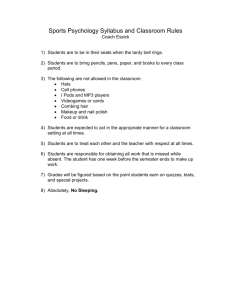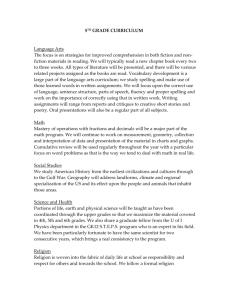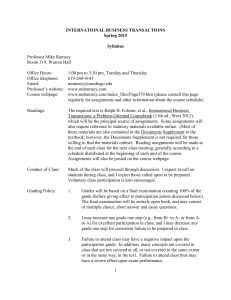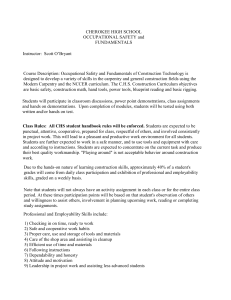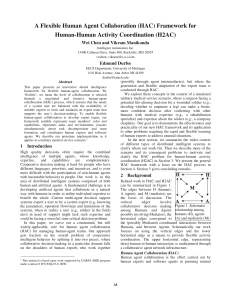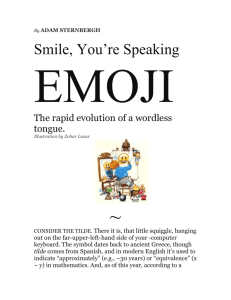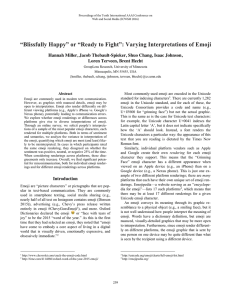Student Code of Conduct and Expectations for Behavior
advertisement
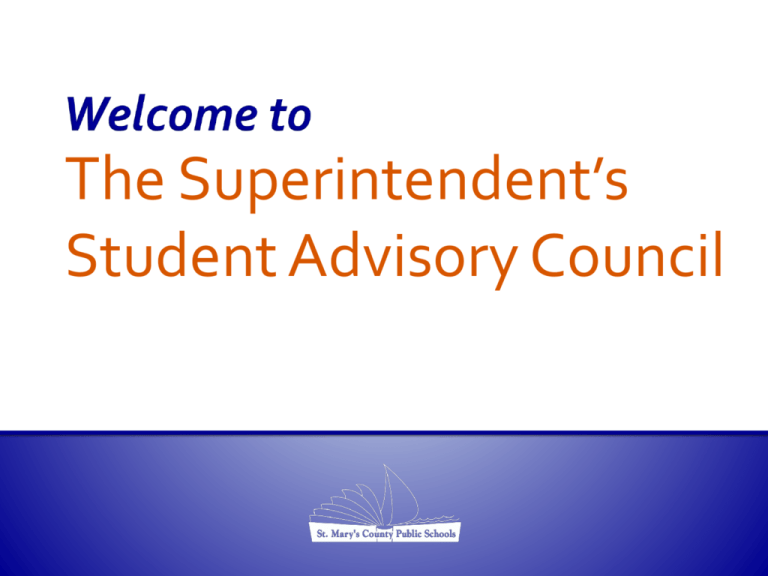
The Superintendent’s Student Advisory Council Introduction and Purpose Setting Reflecting on Commitment Statements Small Group Sessions • High School - One Lunch Discussion • Middle School - Middle School Task Force Discussion Whole Group Working Lunch • Student Code of Conduct • Grading • Risky Behaviors Wrap Up and Next Steps Purpose • To elicit input from students about school programs and processes. The Proposal Annie Forest Gump Scorch trials The Breakfast Club Dirty Dancing Monte Carlo Pride and Prejudice Top Gun The Hunger Games The Longest Ride Hope Floats She's the Man That Thing You Do Mean Girls Farris Bueller's Day Off • • • • Students should be in groups according to their grade Select for your grade group an appropriate name Select for your grade group a representative emoji Write the name of your group and an artist rendering of your emoji on the paper provided What are our commitments to you? Our commitment to Students Is our focus on teaching and learning in order to support students in achieving their goals. Our commitment to Staff Is our engagement in and support of professional growth to meet the expectations of performance. Our commitment to Schools Is to create and maintain safe, engaging, learning environments for our students and staff Our commitment to Stakeholders Is to inform and engage our parents and partners in the education of our children Our commitment to Sustainability Is to only invest in that which furthers our mission and is explicitly built into our budget 1.1 Students have equitable access to rigorous and relevant learning. 1.2 Students are engaged in learning experiences that meet their needs and interests. 1.3 Students are safe and supported in their academic, social, and emotional growth. 1.4 Student learning is aligned to nationally recognized standards. 1.5 Student learning is measured in a fair, meaningful, and timely way. 1.6 Student learning is designed to support students’ preparation for a balanced lifestyle. What do these statements mean to you? What do these mean? Explain each statement in your own words. What question would you ask your peers about this statement? Ex: 1.2 – How engaged are you in your classes? How can we get feedback to see how things are going? How can we encourage students to respond to a survey about these statements? Middle School What is working well in middle school? What challenges do you face? What changes/recommenda tions should we consider? High School What should we consider if we look at a single extended lunch block? What activities would you like to see available at this time? What challenges should we consider? We’d like your input and feedback on a few areas… • The Student Code of Conduct/Expectations • Grading and Feedback about Your Learning • Risky Behaviors and Possible Interventions The Code of Conduct establishes the expectations for behaviors as well as the consequences when rules are broken. We want to hear students’ perspectives of what we need to know for a positive and productive learning experience. Do teachers or other school staff consistently communicate expectations for behavior? Do you know what you’re supposed to do? A. B. C. D. Yes. Almost always. Most of the time. In some cases. Rarely or never. Do you believe behaviors are addressed? If something happens, does someone do something about it? A. B. C. D. Yes. Almost always. Most of the time. In some cases. Rarely or never. Do you think your teachers or other school staff listen to you when you share information about incidents or other behavioral concerns? Do adults listen to kids? A. B. C. D. Yes. Almost always. Most of the time. In some cases. Rarely or never. Do you know who to go to if you personally need help addressing a problem? Do you know who to talk to if something bad happens? A. B. C. D. Yes. Almost always. Most of the time. In some cases. Rarely or never. If you have gone to someone for help, did it make the situation better? Did we help? A. B. C. D. Yes. Almost always. Most of the time. In some cases. Rarely or never. What do we need to know from you? Your grades are one reflection of your learning. We’d like to hear how you get feedback about your progress and proficiency in your classes. How often do you check HAC? A. B. C. D. E. Every day A couple times a week. Every two weeks. Once or twice a quarter. Rarely or never. Does HAC help you plan your week? Do you use the posted assignments to help you plan to complete the assignments by the due date? A. B. C. D. Yes. No. Sometimes. HAC doesn’t help. Do the grades in HAC accurately reflect the work you are doing in class? Do your posted process/product assignments match the work you do in class? A. B. C. Yes. Somewhat. No. Are your grades an adequate reflection of your learning? Do your grades match how much you learn? A. B. C. Yes. Somewhat. No. Do you use the feedback on assignments/tests to help you plan to improve? Do your grades help guide your learning? A. B. C. Yes. Somewhat. No. What else do we need to know from you? How do we get the money to do this? Partnerships? Future meetings Gathering input Future Youth Drug Summit
